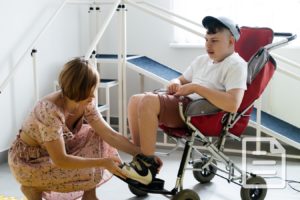How to Talk to Your Children About Disability
By: Brittnie Blackburn
Whether it’s a peer with a diagnosis of Autism Spectrum Disorder or a neighbor who uses a wheelchair, children most likely have someone in their life who they have questions about. Children are naturally curious; thus, it is likely they are interested in disability. No matter the specifics, it is important to be prepared to answer in an honest, open, and direct manner. Doing so can help them gain a better understanding of why people may talk, act, look, or move throughout the world a little bit differently than they do. Below are seven suggestions to keep in mind when talking to your child about disability.
1. Normalize Differences
It is easy for us to be uncomfortable around people or environments that are “different.” Instead of shying away or pretending differences do not exist, let’s approach differences as just that, differences. Differences are not good or bad, they are neutral. It is us, the adults of the world, who create a value scale when it comes to differences. When your child asks why a schoolmate doesn’t talk, you can say something like, “God made Sara’s brain different than he made yours. Not worse. Not better. Just different. Because of how God made her brain, it might take her longer to learn how talk. But she uses a device to help her communicate. You should ask her to show you!” Or, “Our neighbor was born with only one arm, so the doctor made a prosthetic arm to help him.” By providing information in a positive, matter of fact, open and clear manner, you are normalizing their experience when they inevitability cross paths with an individual with differences, disabilities, and/or special needs.
2. Highlight Similarities
While it is important to normalize both physical and intellectual disabilities, it is also important to talk about the things your child and a person with special needs have in common. There are so many similarities! Do they both enjoy soccer? Do they both have blonde hair? Do they both like to play with dolls? Do they both prefer Science over English? Highlighting similarities between your child and an individual with special needs can help remind them that a person with a disability is still a person, first, after all. Which brings us to . . .
3. Use Positive, People-First Language
It is important to focus on the individual as a person first before labeling his or her disability. For example, instead of saying “a Down Syndrome child,” it is more appropriate to say, “a child with Down Syndrome.” Instead of saying “that autistic boy in your class,” it’s better to say, “the boy in your class on the Autism spectrum.” Much like your children’s physical characteristics do not define them, this approach emphasizes that people are more than their disability.
4. Set the Example
Does your child hear you talk about differences on a regular basis? Does your child see you acknowledging and interacting with individuals with special needs? One of the easiest ways to get children comfortable around those with disabilities is for them to see us, the adults in their life, interacting and acknowledging those with disabilities. This approach is much more powerful than waiting for their questions. Model the behavior, with joy and excitement. Children are listening to everything we say and watching everything we do. It is vital that you are talking about disabilities and bridging this gap in an eager, matter-of-fact way. By doing so we are literally changing stigmas and societies.
5. Welcome Their Questions
Children are very perceptive and naturally curious. That is a wonderful thing! Let your children start a dialogue with you around disability awareness. If they see someone in their community and have questions, don’t hush them or change the subject. Answer honestly. Some of their questions could be tough, no doubt. You might not have all the answers, and that is okay! Again, answer honestly. You can say, “I don’t know the answer to that sweetie, but let’s work together when we are home to find the answer.” Or if out in the community and the opportunity arises, ask the parent or caregiver, as most welcome the chance to talk about their child or loved one (who doesn’t?!). I love when I am stopped in public and asked about Clara, my nine-year-old with Cohen Syndrome. This allows me to brag on her, give matter-of-fact explanations, while also normalizing her differences. “Why does she need help eating?” Ask! “Why is she twiddling a string like that?” Ask! “Why doesn’t she talk?” Ask, don’t avoid. Doing so provides a wonderful opportunity for appropriate discussion, learning, and ultimately helps bridge the gap rather than foster fear and confusion.
6. Don’t Overthink it
Many times in life we overthink “how” to act, so instead of moving we stay stuck; we do nothing at all. Don’t overthink it when it comes to disability. Would you make eye contact, smile, or wave to an able-bodied person you pass in the grocery store? If so, do the same to someone with a disability. Is there a child in your neighborhood who doesn’t talk? Acknowledge him with a, “Hi Ben!” just as you would any other children who can speak with their mouths. Don’t think too hard about how to interact. Just interact! Remember, people with disabilities are just people after all.
7. Encourage Inclusivity
Encourage your children to include peers with special needs in their activities. For many children with special needs, their peer-to-peer interaction is very limited. Encourage your child to sit with them at lunch, invite them to play at recess, include them in their birthday party plans, or simply acknowledge their presence with a hello and eye lock (please don’t underestimate this). Even if the child with special needs doesn’t respond in a typical way, know that the effort on your child’s part will not go unnoticed.
Talking to children about disability may seem delicate or awkward, but children are so much more understanding and receptive than we give them credit for, so don’t shy away. And keep in mind that just like many topics in life, this is not a once and done conversation. Continue to keep lines of communication open in your home as it relates to disability. When you see someone out in the community with a disability or learn of a peer in your child’s school, bring it up, ask questions, and revisit the conversation often. And remember, children learn more from what we do than what we say, so make sure they see you engaging with people who talk, act, look, or move throughout the world a little bit differently than you.
CHECK OUT MORE RESOURCES BELOW:

Grace in the Chaos Episode 9: The Mason Family

Grace in the Chaos Episode 8: The John Family

Grace in the Chaos Episode 7: Decker Family

Grace in the Chaos Episode 6: Frost Family

Grace in the Chaos Episode 5: Chen Family

Grace in the Chaos Episode 4: Sneller Family

Grace in the Chaos Episode 3: Rush Family

Grace in the Chaos Episode 2: Smith Family

Grace in the Chaos Episode 1: Robinson Family

